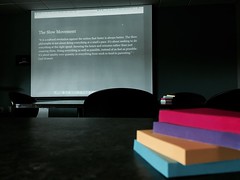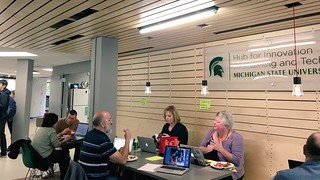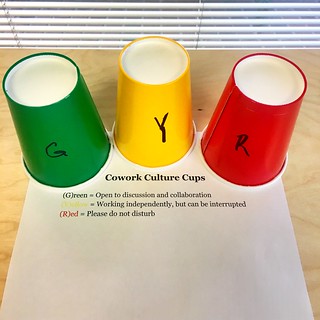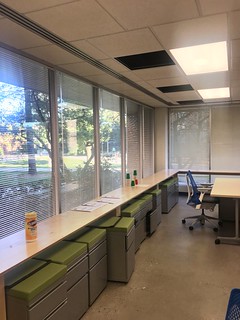 In committing co-facilitating the Online Presence and Public Scholarship Working Group, I’ve also committed to meta & in-process reflection on the process so we can gather data and evidence to provide to the MSU Academic Advancement Network nodes as they’re engaged in finding ways to develop communities of practice that integrate across related disciplinary clusters in novel ways.
In committing co-facilitating the Online Presence and Public Scholarship Working Group, I’ve also committed to meta & in-process reflection on the process so we can gather data and evidence to provide to the MSU Academic Advancement Network nodes as they’re engaged in finding ways to develop communities of practice that integrate across related disciplinary clusters in novel ways.
To start, I think Week 1 went well – kicking things off with Dean Long‘s workshop (link below) was a great conversation starter and I think helped to contextualize things to a wider university/academic audience, then, our smaller group can dig into their own goals. The 1-hour and 15 minute cowork sessions were very well attended on Wednesday and Thursday and participants were engaged in the “digital hub visualization” activity (details below in slide deck.) I am hoping to foster more discussion in the coming weeks and I know one of our tricky spots as facilitators will be scaffolding these discussions – not everyone cares about say, Twitter, so how can we organize our coworking time to maximize benefits to all? We’re gathering some data from participation over the weekend and hope to use that to build a “schedule” for upcoming discussions. I put the word schedule in quotes because we are really trying hard to push against this being sit-and-get, we really want to create an organic responsive environment. I’m so excited to be working with Scott & Stephen on this because we have very different sets of skills and strengths and I think this will come in very handy as we flex and respond to requests from our 20 participants. (We also have a close eye at scaling this beyond 20.) We all have networks we can rely on that we can bring into the conversation — which — leads me to my request to you, my network, this week:
The majority of participants are tenure stream faculty and we are talking about the use of social media (and blogging in particular) to help with the promotion and tenure process. They have heard a lot about it can be useful, but, mentor texts would be very helpful in concretizing the benefits. I provided this example from my own use of blogging to support my annual review process as an academic specialist. Because I blog about every presentation, workshop, paper, etc. I’m able to gather evidence and artifacts quickly and easily and THEN take the time to do the reflection on those pieces (or just copy/paste from reflections I did on the blog.) Tenure stream friends – how do you do this? Do you have any suggestions? Tips? Tricks? Struggles?
Finally, we (Scott, Stephen and I) have decided to send out a weekly email on Fridays to recap the cowork sessions. (Copy/pasted for you below with some of the internal links redacted.) We are offering two meeting times/week and need to find a way to connect the two groups. We want to keep this fairly low stakes/tech right now – so we’re choosing to use email and a shared Google folder to serve as our main connection points. Down the road a hashtag may develop or other collaboration platforms may emerge as being useful.
Happy Friday!
=====
Good afternoon –
It was wonderful meeting all of you this week. We started our working group with an excellent kickoff on Tuesday by Chris Long, Dean of the College of Arts and Letters, which helped showcase different faculty approaches to digital identities and scholarship. His blog about the workshop can be found here: http://www.cplong.org/2016/09/bringing-your-cv-to-life/ and the Storify of the tweets from the session can be found here: https://storify.com/cplong11/bringing-your-cv-to-life.
For those that were unable to attend, Scott has the recording and will be posting it soon. We will be keeping an archive of all the weekly email/links/notes/recordings and meeting times and locations here: [internal link]
In this first week of cowork sessions we used post-it notes to visualize our academic products and piled & reorganized, sorted & interpreted them to make maps and visualizations for our scholarly presence plans. In short we tackled:
- How public or private you would like those artifacts to be and
- Types of tools that might prove useful in displaying and connecting those artifacts
Here is a link to the slide deck that guided our discussion:
We heard lots of questions arise across the two days– around sharing journal articles (should we use Academia.edu?), our existing presence (who is in control of what is already out there?), what tools should I use? How are issues of accessibility addressed in our discussion? Should I start over with my web presence? Who “owns” your URL or web address? We will be using these questions to shape future discussions.
Finally, we promise not to survey you too much, but, we do have one quick survey for you. In the early stages of our planning your responses to this survey are very helpful in shaping the experience & people/experts we ask to engage with our group over the next few weeks. If you can fill this out by Tuesday, October 11, we would greatly appreciate it: [ internal link to survey ]
Have a great weekend –
Leigh, Stephen and Scott





